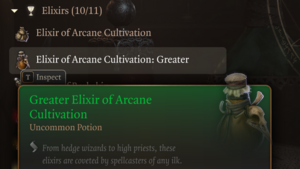Ad placeholder
Elixirs: Difference between revisions
Guybrush42 (talk | contribs) (Bit of clean-up and slight reorganisation) |
Guybrush42 (talk | contribs) |
||
| Line 346: | Line 346: | ||
== Terminology Note == | == Terminology Note == | ||
In-game, "Potion" is used as a general category of liquid consumables that includes the more specific categories of [[Potions]], [[Coatings]] and Elixirs, which highlighted in tooltips. Only consumables labelled as "elixirs" follow the specific rules mentioned above. | In-game, "Potion" is used as a general category of liquid consumables that includes the more specific categories of [[Potions]], [[Coatings]] and Elixirs, which are highlighted in tooltips. Only consumables labelled as "elixirs" follow the specific rules mentioned above. | ||
In the tabletop game, "elixir" is just a word used to name particularly powerful potions, and a few potions in ''Baldur's Gate 3'' follow this convention despite functioning as regular potions. These "false elixirs" are included in the [[Potions]] page. | In the tabletop game, "elixir" is just a word used to name particularly powerful potions, and a few potions in ''Baldur's Gate 3'' follow this convention despite functioning as regular potions. These "false elixirs" are included in the [[Potions]] page. | ||
Revision as of 00:32, 7 December 2023

Similar to Potions, Elixirs are consumable items that can be drunk as a bonus action to apply a variety of beneficial effects. Unlike Potions, the effects of an Elixir last until either taking a long rest or drinking another Elixir. Many Elixirs can be created with Alchemy.
A character can only benefit from the effects of one elixir at a time: drinking an elixir immediately cancels any active effects of a previously drunk elixir.
Other activities can cause elixir benefits to end, including:
- Praying at the Altar to Shar in the Gauntlet of Shar

List of Elixirs
Unique Elixirs
These elixirs cannot be crafted and are not sold by normal merchants. They can only be obtained by giving blood samples to Araj Oblodra, and each character can only do this once, so the number available is limited.
| Name | Rarity | Value | Effect |
|---|---|---|---|
| Rare | 10 |
| |
| Rare | 10 |
| |
| Rare | 10 |
| |
| Rare | 10 |
| |
| Rare | 10 |
| |
| Rare | 10 | Add your Proficiency Modifier to Saving Throws until you succeed on 3 of them | |
| Rare | 10 |
| |
| Rare | 10 |
| |
| Rare | 10 | Gain Proficiency in Sleight of Hand checks and can cast | |
| Rare | 10 | Regain equal to your Constitution score.
(This is an instantaneous effect, more like a potion than an elixir.) | |
| Rare | 10 | The next time you are , you instead drop to 1 hit point | |
| Rare | 10 | Gain Advantage on Skill Checks | |
| Rare | 10 | Gain Proficiency in all skills | |
| Rare | 10 |
|
Other
The following items are called Elixirs, but function more similary to Potions.
Turn Based Duration
Terminology Note
In-game, "Potion" is used as a general category of liquid consumables that includes the more specific categories of Potions, Coatings and Elixirs, which are highlighted in tooltips. Only consumables labelled as "elixirs" follow the specific rules mentioned above.
In the tabletop game, "elixir" is just a word used to name particularly powerful potions, and a few potions in Baldur's Gate 3 follow this convention despite functioning as regular potions. These "false elixirs" are included in the Potions page.